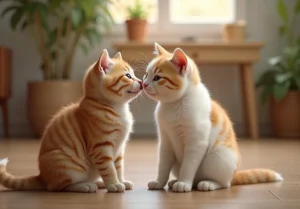Cats are mysterious creatures, with behaviors that often leave us scratching our heads in confusion. One such behavior that many cat owners have surely noticed is their tendency to sniff the air. But why do cats do this? What are they trying to achieve by sticking their noses in the wind?
When cats sniff the air, they are utilizing their powerful sense of smell to gather information about their surroundings. This behavior is driven by their innate curiosity and their need to gather information about potential threats, prey, or even potential mates. By sniffing the air, cats can detect scents that may not be immediately obvious to humans, helping them navigate their environment more effectively.
How do cats use their sense of smell?
Cats have an incredible sense of smell that they use for various purposes. Smelling the air allows them to gather information about their environment, other animals, and potential prey. When a cat sniffs the air, they are analyzing scents to detect potential danger or opportunities. Their sense of smell is much more powerful than ours, allowing them to pick up scents we may not even notice.
In addition to using their sense of smell for survival, cats also use it for social interactions. They can identify other animals in their territory, determine if another cat is ready to mate, or even detect familiar scents from their humans. Therefore, sniffing the air is a crucial part of how cats navigate and understand the world around them.
Do cats sniff the air to communicate with other animals?
Cats do indeed use air-sniffing as a form of communication with other animals. When a cat sniffs the air, they are not only gathering information but also sending out olfactory messages to other creatures. This form of communication helps establish boundaries, mark territory, and even express interest in potential mates.
Interestingly, cats can also use their sense of smell to communicate emotional states. For example, a distressed cat may release certain pheromones that can be detected by other felines in the area. This allows them to share their emotional state without needing to rely solely on vocalizations or body language.
In conclusion, a cat’s ability to sniff the air is a multifaceted tool that they use for survival, social interaction, and communication with other animals. So the next time you see your feline friend lift their nose in the air, remember that they are taking in a wealth of information about the world around them.
What scents are cats most sensitive to?
Cats have an incredible sense of smell that allows them to detect scents that are imperceptible to humans. Cats are most sensitive to pheromones, which are chemical signals released by other animals. These pheromones help cats communicate with each other, marking territory, signaling mating readiness, or indicating fear or stress.
Additionally, cats are highly sensitive to food-related scents. This is why they may show interest in certain foods or treats, based on the aroma they release. Similarly, cats are attuned to the scent of potential prey, with certain odors triggering their hunting instincts.
Furthermore, cats are particularly sensitive to the scent of catnip, which contains a compound that acts as a stimulant for many felines. When cats sniff catnip, it can lead to playful behavior or relaxation, depending on the individual cat’s reaction.
To cater to your cat’s sensitive nose, consider providing a variety of scents through toys, treats, or scratching posts. This can stimulate their senses and keep them engaged and happy.
Can cats detect danger through sniffing the air?
Cats rely on their keen sense of smell not only to navigate their environment but also to detect potential threats. By sniffing the air, cats can pick up on scents that indicate danger, such as the presence of predators or unfamiliar animals in the vicinity. This allows them to stay alert and prepare for potential confrontations or escapes.
Moreover, cats can detect changes in the environment through smell, such as smoke, chemicals, or other hazardous substances. This ability to sniff out danger helps cats avoid harmful situations and stay safe in their surroundings.
In addition to danger detection, cats can also use their sense of smell to locate sources of food or water. Their olfactory senses play a crucial role in their survival instincts, guiding them towards sustenance when needed.
To help your cat feel secure and safe, create a comfortable environment with familiar scents and minimal stressors. This can help reduce their anxiety and allow them to use their sense of smell effectively in detecting potential dangers.
Do indoor cats sniff the air as much as outdoor cats?
Indoor cats may not have the same opportunities as outdoor cats to sniff the air, but they still exhibit this behavior to some extent. While outdoor cats have more stimuli, such as the scents of other animals and plants, indoor cats can still benefit from sniffing the air to engage their senses.
To encourage your indoor cat to sniff the air more, consider opening windows occasionally to let in fresh air (ensure screens are secure), using cat-safe plants indoors to introduce new scents, or setting up a safe outdoor enclosure like a catio for supervised outdoor experiences. These simple steps can help satisfy your indoor cat’s natural curiosity and need for olfactory stimulation.
How can cat owners encourage healthy sniffing behaviors?
1. Enrichment activities: Provide interactive toys that dispense treats or scents for your cat to sniff out, encouraging mental stimulation and natural investigative behaviors.
2. Outdoor time: If possible, create a safe outdoor space for your cat to explore and sniff different scents in a controlled environment.
3. Catnip and other herbs: Offer your cat catnip or other cat-safe herbs to stimulate their sense of smell and provide sensory enrichment.
4. Regular playtime: Engage in regular play sessions with your cat using toys that incorporate scents like catnip or food, encouraging them to sniff and investigate during play.
5. Rotating toys and scents: Introduce new toys and scents regularly to keep your cat’s environment interesting and engaging, satisfying their natural curiosity.
By incorporating these tips into your cat’s daily routine, you can promote healthy sniffing behaviors that satisfy their natural instincts and provide mental and sensory stimulation.
(For further information on cat enrichment, check out this helpful resource from the American Association of Feline Practitioners: https://catvets.com/cat-owners/enrichment/)
Are there certain times when cats sniff the air more frequently?
Cats have a keen sense of smell that they rely on heavily to gather information about their environment. You may notice your feline friend sniffing the air more frequently in the morning and evening, as these are popular hunting times for cats when prey is more active. Additionally, if there are new scents in the house, such as food cooking or a new visitor, your cat may engage in more air-sniffing to gather information about these unfamiliar smells. Keep an eye on your cat’s behavior during these times to understand their heightened interest in scent exploration.
Are there any health concerns associated with excessive air-sniffing?
While it’s natural for cats to sniff the air to gather information about their surroundings, excessive air-sniffing could potentially indicate underlying health concerns. Cats with respiratory issues, such as allergies or upper respiratory infections, may sniff the air more frequently as they try to clear their nasal passages or alleviate discomfort. If you notice your cat excessively sniffing the air along with other symptoms like sneezing, coughing, or nasal discharge, it’s essential to consult your veterinarian to rule out any health issues. Maintain a clean environment free of irritants to help alleviate your cat’s respiratory discomfort.
Fun Facts About Cats’ Sense of Smell
Cats have an incredible sense of smell that plays a crucial role in their daily lives. Did you know that a cat’s sense of smell is 14 times stronger than that of a human? This heightened olfactory ability allows them to detect scents from long distances and pick up on subtle changes in their environment.
Another fascinating fact is that cats have a special organ called the Jacobson’s organ, also known as the vomeronasal organ, located on the roof of their mouth. When a cat sniffs the air, you may notice them making a funny facial expression called the Flehmen response, where they curl back their lips to help draw scent molecules into this organ for further analysis.
Additionally, a cat’s sense of smell is closely linked to their survival instincts. They use their keen sense of smell to hunt for food, identify potential threats, and navigate their surroundings. So, the next time you see your feline friend sniffing the air, remember that they are utilizing this powerful sense to explore and make sense of the world around them.
Why Do Cats Sniff the Air?
When cats sniff the air, they are not just taking in random scents for fun – they are gathering vital information about their environment. By sniffing the air, cats can detect prey, potential mates, rivals, or even danger lurking nearby. This behavior is an essential part of their survival instincts and helps them navigate their surroundings effectively.
Cats also sniff the air as a way to communicate with other animals. They can pick up on pheromones left by other cats or animals, which can give them valuable information about the presence of potential threats or opportunities for social interaction. So, the next time you see your cat sniffing the air, know that they are using this behavior as a tool for communication and survival.
Alex, a passionate animal lover, has experience in training and understanding animal behavior. As a proud pet parent to two dogs and three cats, he founded AnimalReport.net to share insights from animal experts and expand his knowledge of the animal kingdom.




